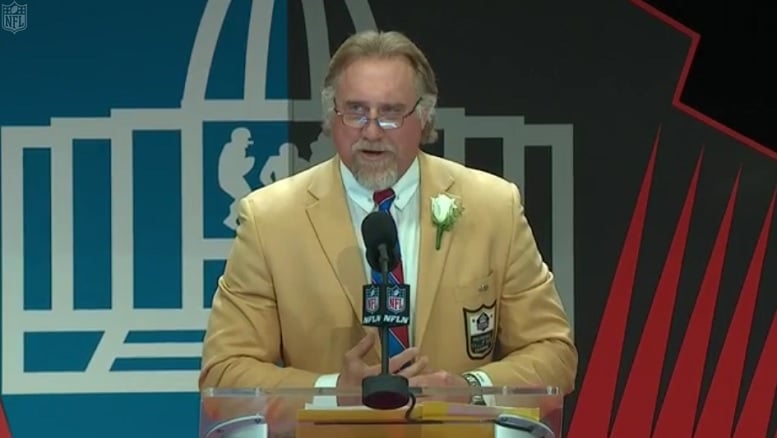Hall of Fame outside linebacker Kevin Greene was among the first players to benefit from the free agency era in the early 1990s, signing a three-year contract with the Pittsburgh Steelers that season that was worth $5.35 million, which was quite a sum at the time. I believe the salary cap for the 1993 season was about $32 million, for comparison’s sake.
As the first generation of players to benefit from unrestricted free agency (though he did spend his first eight seasons with the Rams), Greene got the chance to dip into the pool multiple times, also having a three-year stint (over two separate contracts) with the Carolina Panthers and spending a year with the San Francisco 49ers as well.
Still, nearly two decades after he retired, he is not convinced that the free agency era has been good for the game. “No question, that’s debatable”, he said in an interview with the Talk of Fame Sports Network. Green, currently an assistant coach with the New York Jets, noted that “it’s definitely been good for the players”, but adds “you would kind of have to say that teams are more in a state of flux now with free agency than they were without free agency”.
Of course that was an inevitable and known byproduct of the free agency system when it was put into place. Nobody was caught off-guard by the fact that players would be changing teams more when they were given more access to a variety of potential employers.
Greene goes offer an interesting perspective because he is a player who played roughly half of his career prior to the advent of unrestricted free agency and then about half of it in that era. He has gotten the opportunity to see how each era has affected the locker rooms around him.
“Every year you’re adding people, trying to bring them up to speed as quick as you can on your system, get them on the field and get them productive as quick as you can”, he said. “And you’re losing good players that you have to make really hard decisions about. So, it is very, very debatable as to whether it’s been good for the league or not”.
But he does understand that it was inevitable. And probably if he thought about it more would realize that it is necessarily good for the game. Without it, players would be on strike a lot more often. He was a participant in the 1987 strike, which got the ball rolling for the eventual arrival of the free agency era.
“We all kind of knew that free agency was going to take off eventually, and it was just going to be good for all of us to shop our wares across the league to the highest bidder”, he reflected on that time. “I’m happy for the fellas that are making the money that they’re making now”.
He did leave off on one note, saying that he wished today’s players “would just remember some of the ‘old heads’ that did walk on that picket line back in ’87 and lost paychecks”, including himself, “so that these kids now can be making multi-million dollars a year”.
“I just wish they would remember them just a little bit more”, he wrapped up. His annual salary on the deal that he signed with the Steelers is nearly the equivalent of what a veteran of eight seasons would make as a minimum salary today.








